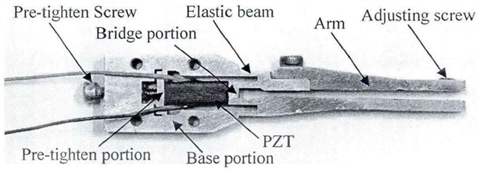With the advancement of technology, chip functions are becoming increasingly complex, and the number of leads on a single chip is increasing, requiring faster lead bonding speeds. This necessitates faster response times for tweezers (<1ms), smaller overall size and motion inertia, and smaller lead diameters.
High demands are placed on the output displacement and holding force accuracy of tweezers due to the decreasing lead diameter.
|
Tweezer basic performance parameters: |
|||
|
Output Displacement |
Resonant Frequency |
Response Time |
Overall Length |
|
>80μm |
>600Hz |
<1ms |
<100mm |
General Description:
A tweezer typically consists of a pair of lead tip clamps and a drive unit that provides the driving displacement and force.
Drive Type Selection:
The drive type is a key factor in tweezer design, as it determines the structural dimensions and performance of the tweezers, which in turn determine the selection of materials and manufacturing processes. Common Drive Types including Electromagnetic Valve Drive、Ultrasonic Motor Drive、Piezoelectric Ceramic Drive、Piezoelectric Bimorph Drive and Linear Motor Drive ,etc.
Comparison of Different Drive Sources:
|
Tweezer Drive Types |
Advantages |
Disadvantages |
|
Electromagnetic Valve |
Easy to control Large driving displacement Low cost |
Prone to heat up Slow response time Yoke vibration affects accuracy |
|
Ultrasonic Motor |
High frequency High precision Mature manufacturing process |
Slow response time Large inertia
|
|
Piezoelectric Ceramic |
Fast response speed High resolution Easy control Small size Low cost Simple structure |
High driving voltage Small displacement |
Advantages of Piezoelectric Ceramic Drive
a. Simple and easy to assemble: Compared to electromagnetic valve drive and ultrasonic motor drive, piezoelectric ceramic drive has fewer components, simpler assembly, and easier control.
b. Fast response speed: The response time of piezoelectric ceramic drive is faster than electromagnetic valve drive, reaching sub-millisecond levels.
c. Compact structure with large driving force: Compared to electromagnetic valve drive, ultrasonic motor drive, and other drives, piezoelectric ceramic drive has a smaller size, lower inertia, and easier control.
d. Mature technology and low cost: Piezoelectric ceramic drive is suitable for batch production, with lower costs, making it widely used in precision instruments and semiconductor equipment industries.

Piezoelectric Ceramic has several advantages, including: Simple structure、High energy density、Fast response speed、High resolution. However, the piezoelectric effect also produces a small deformation (typically 0.1% of its own length), which requires mechanical amplification to achieve a larger displacement. Micro-displacement amplifiers often use flexible hinges due to: Small volume、No mechanical friction、Automatic elastic return、No gaps and Suitable for small-range deflection connections.
The output displacement of the gripper can be effectively adjusted by controlling the size of the driving voltage to the piezoelectric ceramic. However, as the frequency of the piezoelectric drive increases, the response speed of the amplifier gradually fails to match the driving speed of the piezoelectric ceramic, which will directly cause the gripper to fail to complete the action of picking and placing wires normally. When the gripper is working normally, it should simultaneously meet two conditions:
a. The opening or closing action of the gripper claws must be fast and stable, with minimal residual vibration.
b. The dynamic response speed of the amplifier should match the driving speed of the piezoelectric driver as closely as possible, to enable effective control over the working cycle of the gripper.
YiNGUAN's solution provides a stacked-type piezoelectric ceramic driver and matching control, applied to the wire bonding process in chip manufacturing, where the piezoelectric gripper can respond quickly and accurately.
Our self-researched and self-produced piezoelectric gripper can rapidly pick up and release wires, stacked-type piezoelectric ceramic can generate a large driving displacement at a relatively low voltage, power amplification circuit can amplify the sawtooth wave signal, reducing the required driving voltage.
We could customize the inherent frequency of the piezoelectric gripper to meet customer requirements, satisfying their demand for high and stable driving frequencies while minimizing residual vibration in the gripper.
According to client requirements, we select and design suitable displacement amplifiers and drivers, and perform simulation modeling of the overall structure to meet client performance specifications.
Our stacked-type piezoelectric ceramic driver uses a layered structure of ceramic plates, which responds to electric signals by stacking the displacement output, achieving a maximum displacement exceeding 100μm.
We offer a wide range of product specifications to match various gripper designs.
To meet client-specific needs and application scenarios, our products has integrated sensor chips for closed-loop control and offer self-developed drivers that meet high-voltage requirements, achieving technical and cost advantages through product combinations.
Our company has four domestic service centers in Shanghai, Suzhou, Guangzhou and Chengdu, which can quickly respond to the needs of customers across the country for technical upgrades, project development and maintenance, etc.
At present, the company's piezoelectric ceramics have achieved mass production, completed market verification in areas such as lithium power battery pole piece coating, and provided stable and continuous supply.